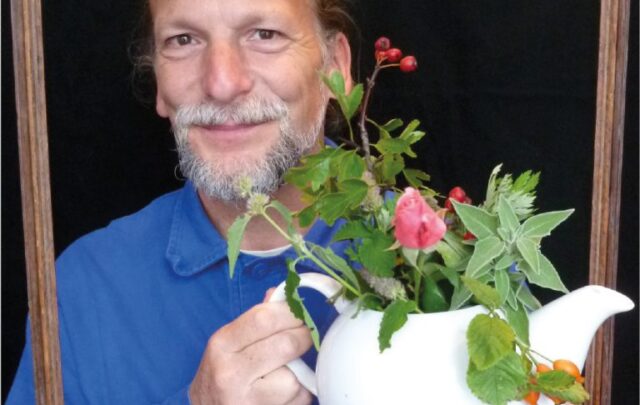In prison was not where I was expecting to spend any time during my travels around small scale farmers and growers! That’s exactly where I did spend a quite unforgettable day, though, specifically at HMP Rye Hill.
HMP Rye Hill is a category ‘B’ training prison situated in the village of Willoughby, near Rugby in Warwickshire, and holds 664 sentenced male adults, 20% of whom are serving life sentences. It was opened in early 2001, and constructed and to be operated by G4S on behalf of the Home Office. In order to be posted to Rye Hill prisoners must have been sentenced to 4 years and over. Category B means that preventing escape is always paramount and security on that front maximum. All prisoners at Rye Hill have been convicted of sexual offences, a chilling fact when faced with the prospect of visiting.
I had heard on the grapevine during my travels that an organic vegetable garden was playing an key role for many prisoners in the rehabilitation from drug and substance abuse. This fact was confirmed when I phoned to check things and out and enquire if there was likely to be opportunity to visit. Not much hope was held out for the latter point though – ‘you can write to the director, but don’t hold your breath’ being the advice!
The price of stamp seemed worth the effort of writing and I duly wrote, but not expecting much back. To my astonishment I received an invitation to visit and photograph direct for the Director, Richard Stedman. What I had not known at the time is just how exceptional a character Stedman is as a prison director, as reflected in a subsequent report on the prison published in The Independent – see Rye Hill: Inside the prison changing the landscape for serious sex offenders.
So it was that I arrived at the solid wall of bullet proof glass which separates the reception staff at Rye Hill for the incoming world. With all communication through an intercom built into the wall, I deposited all possessions – money, keys, camera add-on equipment etc. – in secure locker space and was ushered through the triple interlocked doors to meet with Robin Baxter, my host for the day.
Robin is an accredited Master Gardner in the Garden Organic Master Gardener Programme and had applied for and been offered the job of setting up and running a market garden which was to be part of the rehabilitation scheme in the prison delivered by Garden Organic in conjunction with G4S, the prison’s Substance Misuse Services and Public Health England. As we walked in the shadowy corridor between main outside walls and internal secondary walls – a sort of prison moat with movement only possible in one direction of the sun-less space – Robin explained that within Rye Hill challenging offending behaviour is believed to be pivotal to success in rehabilitating and preparing prisoners for release. Rye Hill had in the past been heavily criticised in inspection reports from HM Inspector of Prisons and urgent action had been demanded after finding that the prisoners were bullying the staff, inexperienced officers were deliberately overlooking behavioural violations and contraband items for their own safety and some inmates reported that knives, drugs and alcohol were readily available at the prison. The Stedman regime was tackling this head on and a new recently completed inspection had rated the prison highly, with the gardening activities one of the factors in this.
By this time we had reached the garden area and duly passed through the doorway of the inner security wall to its green and verdant spaces. Prisoners were just leaving the area for regulatory lock down time to be followed by lunch. I was offered the opportunity to meet with others in the rehabilitation team and generally get used to the surroundings before prisoners returned to their chosen activities early afternoon.
There must have been 60 or so who had elected to work on the garden. Walking round, meeting and talking with them will for ever be one of the most remarkable experiences of my life. Remarkable not for the distorted, unsocial, unacceptable or distinctive views and behaviour but for the complete ‘normalness’ of behaviour and conversation. I could have been anywhere. So normal as frankly to be quite frightening. To talk with someone about his prize chile peppers, how he chose them, why he chose to do so and the pleasure it gives him, to then to be told he is in for life is just to un-nerving to be put into words.
The prisoners are allowed to work in the garden during the later stages of rehabilitation, so I am sure I was privy to a particularly good side of prison life. But to see contact and working with the earth being part of reforms in character and behaviour which can only be of enormous benefit to both the individuals concerned and society at large* was a real privilege and can only provide hope for what would otherwise be a much troubled future. Thank you to everyone, Richard Stedman in particular, for allowing me such an enriching day.
* An independent evaluation by Coventry University found that there is an overwhelmingly positive connection between working in the garden and the success of participants’ journeys of recovery
Click here to buy the book Unlikely Heroes – the documentary photobook about the current agrarian renaissance in England and Wales, and featuring HMP Rye Hill.





